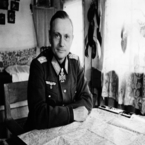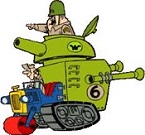GloriousRuse
Posts: 906
Joined: 10/26/2013
Status: offline

|
Re: HYLA, radios, and coordination.
The early Germans did have more radios, hands down. As it relates to this question, that really gave them increased tactical level ability and the ability to be agile in and around the structure of a plan. When it comes to actually making a multi division plan in WW2 though, it's paper, acetate, and in person meetings. That all travels by courier and hard copy. At a technological level, how you assemble and put the planning framework in place for Kursk or Yelna look pretty much the ssame...the Germans are just way better at it professionally in '41. But just getting 800 tanks to the starting line and pointed the right way would have looked like paper and acetate for both sides.
After that is when radios matter, but even then you have to account the vast doctrinal differences. Let's take you point , "but how would tanks know how to go to the next objective" as an example.
The German lesson from 1918 was that small units, well handled and with iniative and agility would break a front, and it was only a matter of adding mobility and traveling fire support and you would be able to actually sustain what the lessons of 1918 had already taught you how to win. Their answer to your question is a horrified stare that the very small units they relied on for big successes would ever not have the communication to enable and exploit a breakthrough, rolling notbjust on to new objectives but picking their own and letting higher know. You can't coordinate that without radio.
The soviets learned a very different lesson set. That local success was ultimately pointless unless tied into a successive series of hammer blows that didn't just penetrate, but obliterated, the front in depth. Their answer to your question would be "we could call the commander if he's alive, and he can take a moment to talk to his people in person, or just signal flag them to follow. But why are we going to a new objective? The first echelon got in a fight, that is what it's there for. Someone else will be passing througb" Where the Germans wanted wild and flukd big results from small units, thesoviets wanted small and predictable results from big units that could be chained together. Both doctrinaly and dogmatically many soviet theorists thought small professional armies were madness. And if you had to accept that a massive army drawn from the people to create a series of ever strengthening blows to break the enemy was the way to win a war, then you dint really care if a company could go to a second objective at a moments notice. That was someone else's job. All you cared about was that they achieved what you told them to do up front, and you could parse what you wanted to do later. So for them coordinating 800 tanks tactically wasn't that hard. Give them objectives and sectors. Give the second echelon deeper objectives. There you go.[code][/code]
|
 Printable Version
Printable Version









 New Messages
New Messages No New Messages
No New Messages Hot Topic w/ New Messages
Hot Topic w/ New Messages Hot Topic w/o New Messages
Hot Topic w/o New Messages Locked w/ New Messages
Locked w/ New Messages Locked w/o New Messages
Locked w/o New Messages Post New Thread
Post New Thread